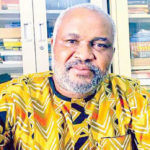Otherwise, you will control it and give expression to the instinct of submission, and thereby save yourself from unemployment, and your family from penury and starvation.
Several other illustrations can be given to demonstrate that it is well within the capacity of a man or woman to control or sublimate his or her instincts.
There are two steps to the control and sublimation of an instinct.
The first is to recognize it as a natural and inseparable part of your being. There is nothing to be ashamed of about an instinct. And to condemn or repress it is tantamount to denying the existence of what is inborn and ordained to give you powerful motivation as long as you live. The second is to cultivate the habit of reflecting on and rationalizing the circumstance which gives rise to the display of any of your instinctive urges. It does mean that, occasionally, such as on a sudden encounter with a lion, we have to think fast and on the spur of the moment. There are other instances when we have plenty of time for reflection, rationalization, and positive redirection of an instinctive urge. For instance, it is confidently claimed by psychologists that the instincts of sex and self-assertion can be sublimated by means of creative, charitable, and philanthropic activities. It is equally claimed by them that the repression of, or unconscious denial of expression to, any instinct will certainly lead to ill-health and unhappiness.
A man’s environment is composed of geographical and social factors. The former consist of the Seasons with their attendant climate and weathers, and of physical surroundings such as soil,
vegetation, animals, insects, etc. The social factors consist of the society in which we live, its structure and the individual members who constitute it, together with the peculiar customs, mores and ethos, as well as the economic, political and other social systems which are in vogue.
It behoves man to understand all these, and, where possible, bend them to his needs.
The seasons he cannot change. But he can adapt himself to them as well as eliminate or minimize the adverse effects on him of their attendant climate, and weathers by means of suitably and scientifically regulated food, clothing arid housing. As for the physical surroundings, he can make them do his bidding. If they are inadequate for his purposes, he must suPPly their deficiencies;
if they are hostile, he must subdue them. Man is not born togrope in the face of adverse environmental circumstances and conditions: he is ordained, and endowed with the capacity, to comprehend the universe, conquer his immediate surroundings, and rule the world.
But first, he must understand the world and all its phenomena: he must do sosystematically and scientifically.
‘Man,’ says Aristotle, ‘is a political animal’. So indeed he is in the sense that he is a gregarious and social animal. He must learn to live amicably and harmoniously with his family, and with the other members of the society in which he is born, domiciled, resident, or carries on business. If the society or any of its institutions is primitive, backward, under-developed, oppressive, or evil in any sense, he has a duty to himself and to the society at large to improve it. Because of his endowments which we have just noted, and more of which we will note later on, he cannot be heard to plead ignorance, incapacity, or impotence of any kind whatsoever. Therefore, he cannot afford to take any physical or social phenomenon for granted.
He must diligently probe the world. But, as we have said, he must first of all understand his physical and social surroundings, and in order to understand he must be properly educated. For it is only when he knows the law that governs the universe of which the world in which he lives is a part, the rigours of Nature, and the aberrations of society, and can, with the necessary physical, mental, and spiritual equipment, devise ways and means to temper and humanize them to satisfy his sublimated yearings, that, man can hope to live a full and happy life.
By exercise we mean physical, mental, and spiritual exercise. These three forms of exercise are indispensable to ‘a sound mind in a sound body’. The first does not need either introduction or explanation, except to say that without physical exercise, especially by those who do sedentary and mainly mental work, the body of man will not enjoy the physical soundness which is essential to good health. The only way to exercise the brain is to study, and to do so persistently and reasonably rigorously. Thinking is a spiritual process; and the only way to exercise the mind is constantly to engage in clear, decisive, calm, deliberate, sustained, and constructive thinking with a definite end in view, which end should benefit the thinker as well as others.
In all these exercises, one must obtain as much expert guidance as possible, lest the bounds of moderation and reasonableness are exceeded, with harmful effects. In this connection, the following Words of Haanel are worthy of attention: ‘Remember that your physical body is maintained through a process of continuous destruction and reconstruction. Life is simply an exchange of the old for the new, and health is only the equilibrium which Nature maintains during the process of creating new tissue and eliminating the old or waste tissue.
‘Birth and death are constantly taking place in our body, new cells are constantly being formed by the process of converting food, water and air into living tissue. Every action of the brain, every movement of a muscle means a destruction and consequent death of some of these cells, and the accumulation of these dead, unused, and waste cells is what causes pain, suffering and disease.
It is thinking that distinguishes man from the other animals and makes him the image of God. But it must be systematic and scientific thinking with a definite object in view. It involves observation, collection of data and materials, analysis, synthesis, and reasoned deductions. It demands attention, contemplation, idealization, visualization, and reflection. It needs rigorous training, self-discipline, and self-knowledge. It has tremendous rewards: self-conquest, self-improvement, self-realization, and victory over environment and heredity are some of them.
For the sake of clarity and understanding, this kind of thinking must be distinguished from other kinds so called. Mere perception is not thinking; the lower animals do this too.
But if perception is purposive, then it ranks as thinking. Because in that case, it becomes only the first stage to a perceptual, conceptual, and ideational thinking, each of which is necessarily purposive. Desultory use of the mind, wild imaginings and day- dreamings are not thinking. Even children are more adept in all these than adults. At best these are sheer conceptual or ideational dissipations.
From this description, it is clear that only a very few people do real thinking: the majority do very little of it, if at all. The reasons for this are two-fold. First, man as a thinker is still in his infancy.
Though the age of homo sapiens is put at 40,000 years, yet as a thinker he is, according to Joad,’ only approximately 2,500 years old. Joad dated man’s inception as a thinker from Confucius, Buddha, Lao Tse, Socrates, Plato, and Aristotle, all of whom lived between 600 and 400 years B.C. With respect, we beg to differ.
We are of the opinion that the dawn of human thinking began with
Hammurabi and Moses, that is between the eighteenth and fourteenth centuries B.C. These two were the first among mankind to assemble traditional customs and usages and systematize them respectively into a Code of Law. But even when all this is conceded, man’s infancy and immaturity as a thinker remains.
The immediate ancestor of homo sapiens is said to have emerged during the later glaciations of the Ice Age, nearly 1,000,000 years ago. According to Joad, there has been life of some sort upon our planet for between 600,000,000 and 1,200,000,000 years. It is possible that the original and remote ancestor of man was in existence some 70,000,000 years ago. On these counts, therefore, the infancy of man as a thinker is established beyond any dispute. Secondly, the majority of the people do not have the disciplined education which is indispensable to systematic and scientific thinking. Consequently, their perceptual facuIty is dull, vague, and desultory, and their a perceptual, conceptual, and ideational capacities are either undeveloped or never developed to any significant level. Their talents lie buried. In popular parlance, they can see, but do not understand.
Sociologists have sought to show that what distinguishes man from the other animals is his ability to speak and communicate his ideas and experiences, whether concrete or abstract, to others. But the very invention of language, or what the sociologists term arbitrary symbol, is the product of thinking. It is the greatest invention that man has ever made.
Now when a man is able to think, and is able to do so systematically, scientifically, clearly, constructively, and persistently, with a definite object in view, he is able to act on the immutable law or universal mind and make it materialize, in concrete form, the object of his thought. The universal mind, as we have said before, is latent everywhere, and permeates and pervades all things: it is both immanent and transcendent. It is omnipotent, omniscient, and omnipresent. A man has two layers of mind: the conscious and the subconscious. The physical instrument of the conscious mind is the cerebra-spinal system of nerves; and that of the subconscious is the autonomic system of nerves. When a man thinks in the way which we have described, he is able to impress on the subconscious mind his ideas, ideals, or objects. Once this is done the subconscious mind which is omnipotent, omniscient, and omnipresent proceeds to materialize the idealized objectives.
It follows from the foregoing, therefore, that the subconscious mind and the universal mind are one and the same thing. Indeed they are: both in kind and quality. The only difference between the subconscious mind and the universal mind is one of degree.
The supreme importance of the nexus between the body and the conscious mind on the one hand, and the subconscious mind on the other, must be emphasized. If the body is dead, there can be no life and there can be no mind – whether conscious or subconscious. But what sustain life itself and generate energy in
the body thereby enabling man to think consciously are air, water, food, clothing, and shelter, when used in the right quantity, proportion, and quality. The conscious mind is the medium by which man makes his observations, collects his data, does his analysis and synthesis, and makes his reasoned deductions. The
subconscious mind, on the other hand, does none of these things. It only accepts such findings and conclusions of the conscious mind as are clear, systematic, scientific, and persistent, and proceeds to implement them in its own infinite ways and wisdom.
We see then that the body of man is indeed the temple of God or the universal mind; and we can now find no difficulty in agreeing with the Psalmist when he says that man has been made ‘a little lower than God’. This, in our view is the truth – the only truth. When we know this truth and, by an act of faith or by a process of rigorous and systematic reasoning, are unshakably convinced of it, we automatically enter into the regime of mental magnitude, properly and eminently equipped with a considerable measure of intellectual comprehension and cognition, insight, and spiritual illumination. In this regime, we are free from: (t) the negative emotions of anger, hate, fear, envy or jealousy, selfishness or greed;
(2) indulgence in the wrong types of food and drink, and in ostentatious consumption; and
(3) excessive or immoral craving for sex. In short, in this regime we conquer what Kant calls ‘the
tyranny of the flesh’, and become free.
To those who will rejoin that these ideals are too lofty for human achievement, we quote the eternal words of Jesus Christ, who never enjoins man to impossibilities. Says he: ‘You shall know the truth,
and the truth will set you free.’ In other words, some day in the distant future, we will- all of us- know the truth, and, royally, enter into the regime of mental magnitude, where love reigns
supreme.
I McDougall: Outline of Psychology.
2 Haanel: The Master Key, page 34.
3 Joad: Guide to Philosophy.
YOU SHOULD NOT MISS THESE HEADLINES FROM NIGERIAN TRIBUNE
Lagos Is Second Least Liveable City In The World For 2021
Lagos is the second least liveable city in the world for the year 2021. This is according to the most recent annual ranking put together by the Economist Intelligence Unit (EIU)…
CLAIM 1: A Twitter user claims UNICEF said any efforts to block children from accessing pornography might infringe their human rights.






